|
|
|
Sort Order |
|
|
|
Items / Page
|
|
|
|
|
|
|
| Srl | Item |
| 1 |
ID:
105923
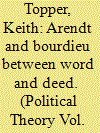

|
|
|
|
|
| Publication |
2011.
|
| Summary/Abstract |
This essay investigates questions about the relationship between language, speech, and democratic institutions by bringing into conversation Hannah Arendt's and Pierre Bourdieu's distinctive views of the politics of language and speech. First, I explicate Arendt's account of the connection between speech, action, and identity disclosure, as well as its role in her broad conception of political institutions. Next, I complicate this outlook by examining Bourdieu's political sociology of language, focusing on the ways that linguistic competences valorized in particular institutional settings operate as mechanisms of silencing, domination, and exclusion. Finally, I bring these approaches together by investigating political events-AIDS activism in the United States during the 1980s and early 1990s-that raise critical issues regarding the politics of language and speech within a specific institutional setting. By reading Arendt and Bourdieu together in the context of these events, one can develop a defensible account of the politics of speech in democratic theory and practice.
|
|
|
|
|
|
|
|
|
|
|
|
|
|
|
|
| 2 |
ID:
190698
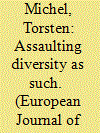

|
|
|
|
|
| Summary/Abstract |
Dehumanisation is one of the most invoked factors in analyses of mass atrocities with many scholars focusing on its crucial role in enabling perpetrators to inflict violence on their victims. However, while its application is widespread, its relevance is often assumed a priori, with claims regarding its empirical relevance often asserted rather than argued for. Not only does its meaning, nature, and function remain amorphous, current scholarship also lacks a general conceptualisation of the basic features that bind the manifold appearances of dehumanisation together. It is this paucity of sustained reflection and particularly the lack of conceptual clarity that the present article seeks to address. Drawing on the work of Hannah Arendt, it aims to deliver a more thoroughgoing appraisal of the nature of dehumanisation as a fundamental violation of plurality to conceptually consolidate and ground its meaning and bind together its diverse manifestations across cases of mass violence.
|
|
|
|
|
|
|
|
|
|
|
|
|
|
|
|
| 3 |
ID:
074530
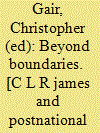

|
|
|
|
|
| Publication |
London, Pluto Press, 2006.
|
| Description |
202p.Pbk
|
| Standard Number |
0745323421
|
|
|
|
|
|
|
|
|
|
|
|
Copies: C:1/I:0,R:0,Q:0
Circulation
| Accession# | Call# | Current Location | Status | Policy | Location |
| 051845 | 813.52/JAM 051845 | Main | On Shelf | General | |
|
|
|
|
| 4 |
ID:
089262
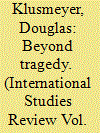

|
|
|
|
|
| Publication |
2009.
|
| Summary/Abstract |
Hans Morgenthau claimed that a tragic perspective enables us to confront more squarely the harsh realities of politics, the evil aspects of human nature, and the ethical compromises action requires. Richard Lebow has more recently identified Morgenthau as an exemplar in making his own case for the "tragic vision." This essay contrasts the sharp differences between Morgenthau's and Hannah Arendt's response to the Holocaust to challenge Morgenthau's claim, and to illustrate the limitations of a tragic perspective. Her turn to law in confronting the problems of evil and responsibility that the Holocaust had so radically posed underscores the need to draw upon other conceptual resources beyond tragedy in our critical engagement with such issues.
|
|
|
|
|
|
|
|
|
|
|
|
|
|
|
|
| 5 |
ID:
031999
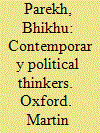

|
|
|
|
|
| Publication |
Oxford, Martin Robertson and Co. Ltd, 1982.
|
| Description |
x, 219p.Hbk
|
| Standard Number |
0855203366
|
|
|
|
|
|
|
|
|
|
|
|
Copies: C:1/I:0,R:0,Q:0
Circulation
| Accession# | Call# | Current Location | Status | Policy | Location |
| 021109 | 923.2/PAR 021109 | Main | On Shelf | General | |
|
|
|
|
| 6 |
ID:
152725
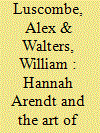

|
|
|
|
|
| Summary/Abstract |
Using Hannah Arendt as our guide, we examine the imperfect and at times curious mechanisms through which state projects enact an aura of secrecy and deception. To date, International Political Sociology (IPS) has paid strikingly little attention to the workings of secrecy and deception in politics. Arendt’s contributions to international political sociologies of state secrecy are threefold. First, Arendt’s reflections on lying and secrecy occur across a wide historico-philosophical field, generating insights that a focus on liberal democracy alone cannot. Second, Arendt draws our attention to important variations in the arts of secrecy and deception, and their ethico-political implications. Third, Arendt highlights the limits of traditional scholarly methods for research on lying and secrecy and offers an important tool that we conceptualize as a twist. We demonstrate these three contributions through a case study of a foggy Anglo-American intelligence project called Cobra Mist.
|
|
|
|
|
|
|
|
|
|
|
|
|
|
|
|
| 7 |
ID:
082353
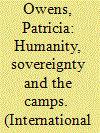

|
|
|
|
|
| Publication |
2008.
|
| Summary/Abstract |
This article responds to the commentary on my book, Between War and Politics: International Relations and the Thought of Hannah Arendt, by Helen M. Kinsella, Richard Beardsworth and Anthony Burke. Burke's claim that Arendt betrays a 'normative defeatism' based solely on his reading of Origins of Totalitarianism is misguided. It is a narrow reading to suggest that Arendt was uninterested in institutions and laws more cosmopolitan in intent than traditional inter-state law. In response to Beardsworth, I argue that Arendt's criticism of the reduction of all politics to violence is not normative in the way he suggests. Nor is it 'merely' to repeat the 'Schmittian/realist argument that conflict is irreducible'. Arendt's agenda is different. Finally, I respond to Kinsella's provocative defence of some concordance (as distinct from equivalence) between the Nazi concentration camps of World War II and US-run camps at Guantanamo Bay, Cuba.
|
|
|
|
|
|
|
|
|
|
|
|
|
|
|
|
| 8 |
ID:
179325
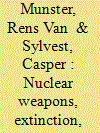

|
|
|
|
|
| Summary/Abstract |
In the Anthropocene, International Relations must confront the possibility of anthropogenic extinction. Recent, insightful attempts to advance new vocabularies of planet politics tend to demote the profound historical and intellectual links between our current predicament and the nuclear age. In contrast, we argue that it is vital to revisit the nuclear-environment nexus of the Cold War to trace genealogies of today's intricate constellation of security problems. We do so by reappraising the work of Jonathan Schell (1943–2014), author of The Fate of the Earth (1982), who came to regard extinction as a defining feature of the nuclear age. We show how a deep engagement with nuclear weapons led Schell to an understanding of the Earth as a complex, delicate ecology and fed into a sophisticated, Arendtian theory of extinction. Despite its limitations and tensions, we argue that Schell's work remains deeply relevant for rethinking human–Earth relations and confronting the Anthropocene.
|
|
|
|
|
|
|
|
|
|
|
|
|
|
|
|
| 9 |
ID:
147239
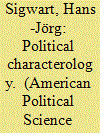

|
|
|
|
|
| Summary/Abstract |
Notwithstanding its status as a modern classic, Hannah Arendt's study on The Origins of Totalitarianism is generally considered to be lacking a clearly reflected methodological basis. This article challenges this view and argues that in her study Arendt implicitly applies a characterological method of political theorizing that provides a genuine conceptual framework for systematically connecting structural analysis with ideographic historical investigations and with a political theory of action. On this conceptual basis, the study renders an analysis of anti-Semitism, imperialism, and totalitarianism not merely in terms of abstract structural concepts, but in terms of dynamic character-context constellations. Arendt's account not only shows interesting parallels to a number of similar conceptual reflections, especially in the 20th century's theory debate; it can also serve to inspire the current debate on methodology in political theory.
|
|
|
|
|
|
|
|
|
|
|
|
|
|
|
|
| 10 |
ID:
090274
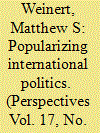

|
|
|
| 11 |
ID:
153670
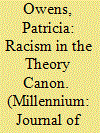

|
|
|
|
|
| Summary/Abstract |
Hannah Arendt’s monumental study The Origins of Totalitarianism, published in 1951, is a founding text in postcolonial studies, locating the seeds of European fascism in the racism of imperial expansion. However, Arendt also harboured deep racial prejudices, especially when writing about people of African descent, which affected core themes in her political thought. The existing secondary literature has diagnosed but not adequately explained Arendt’s failures in this regard. This article shows that Arendt’s anti-black racism is rooted in her consistent refusal to analyse the colonial and imperial origins of racial conflict in the United States given the unique role of the American republic in her vision for a new post-totalitarian politics. In making this argument, the article also contributes to the vexed question of how international theorists should approach important ‘canonical’ thinkers whose writings have been exposed as racist, including methodological strategies for approaching such a body of work, and engages in a form of self-critique for marginalising this problem in earlier writing on Arendt.
|
|
|
|
|
|
|
|
|
|
|
|
|
|
|
|
| 12 |
ID:
139415
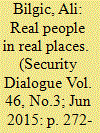

|
|
|
|
|
| Summary/Abstract |
The objective of emancipatory security theory is to examine the insecurities of individuals and social groups that stem from oppressive power processes, relations, and structures. However, the image of power in emancipatory security studies does not correspond to such a normative and analytical motivation. This renders the theory susceptible to substantial criticism on the grounds of inadequate analysis of resisting individuals as agents of security in their own localities. To address this issue, the present article conceptualizes ‘emancipatory power’. In this exercise, Hannah Arendt’s understanding of power, enriched by Judith Butler’s concept of performativity and feminist insights, will be used as the theoretical foundation to tailor collective power based on trust in a ‘moment’ of emancipation. Collective power will be illustrated by references to the protests in Cairo’s Tahrir Square in 2011.
|
|
|
|
|
|
|
|
|
|
|
|
|
|
|
|
| 13 |
ID:
093674
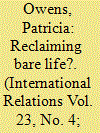

|
|
|
|
|
| Publication |
2009.
|
| Summary/Abstract |
Giorgio Agamben claims that refugees can be seen as the ultimate 'biopolitical' subjects: those who can be regulated and governed at the level of population in a permanent 'state of exception'. Refugees are reduced to 'bare life': humans as animals in nature without political freedom. Contra Agamben, it will be argued here that if refugee populations are not to face some inexorable trend toward a rule of 'exception', then it will not be through reclaiming 'bare life'. It will be wholly dependent on the ability to forge a public realm grounded on the appropriate distinction between nature and political artifice, between human life and the political world. This argument is made through contrasting Agamben's writing on refugees with Hannah Arendt's. What is at stake in the difference is illustrated through the example of refugee lip-sewing.
|
|
|
|
|
|
|
|
|
|
|
|
|
|
|
|
|
|
|
|
|